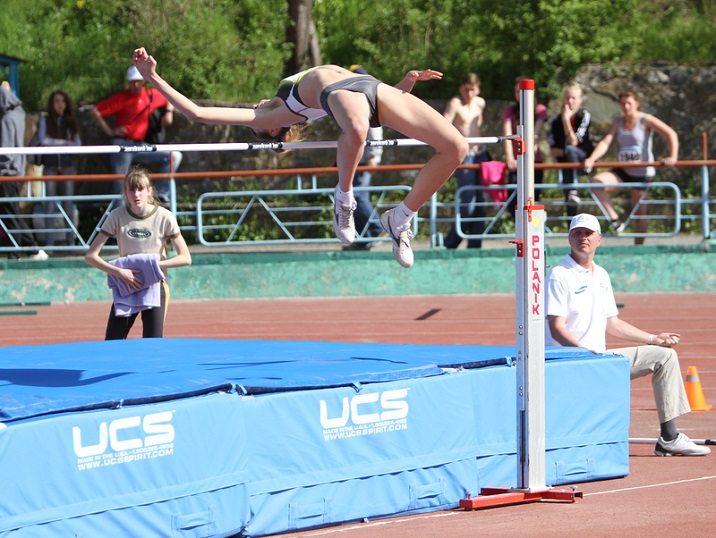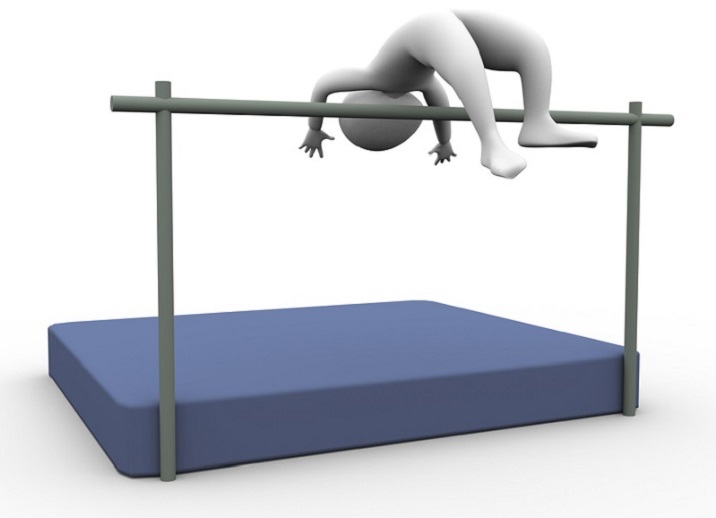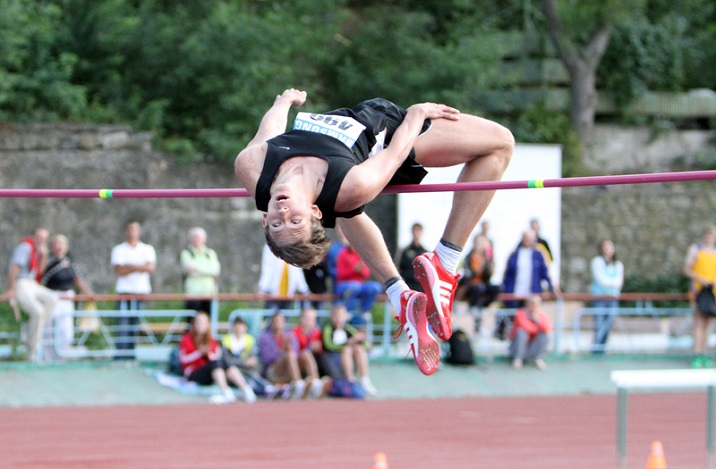
High Jump - Quick Guide
High Jump - Overview
High jump is a game all about height. It is a game in which perfection does matter a lot. To master the act of perfection the athlete needs to practise countless hard sessions with utmost dedication. In this article, apart from playing procedure, we will learn various techniques and disciplines to have a cutting edge over others.

The main objective of this sport is that, the athlete needs to jump over a bar placed over a certain height without touching it. The bar should not be dislodged from its position during the whole process. The athlete will run 1stfor a certain distance then he will jump over the bar with his back towards the bar. For this to happen he needs to make turnings in the air during his leap. This game is played in both men and women category.
High Jump - A Brief History
In 19thcentury first high jump event was organised in Scotland. Scissors techniques and straight on approach had been used more often by the players. Later, modification of the rules like positioning the bar in a diagonal manner instead of straight implemented. But it is the 20th century when players like Michael Sweeneys brought revolutionary modifications like; doing take-off in scissors style but jumping over his back.
Another revolutionary man to bring major change in this game is Dick Fosbury. He used Fosbury flop technique to bag a gold medal at the Mexico City. The popularity of this game can be judged from the fact that it was among the events to be organised in the first modern Olympics in 1896, held at Athens. At that time, Americans were the first to win eight gold medals in this event.
Participating Nations
High jump comes under the track and field job event. Since its introduction to modern Olympics in 1896, the popularity and demand of this game by different nations grew exponentially. Many Asian and non-Asian countries have their active participation in this category of game. List of some of the major dominating Asian countries includes China, Qatar, Japan, India, Kazakhstan, Sri Lanka, etc. In 2014 Asian games, Mutaz Essa Barshim of Qatar bagged the gold medal in mens category and Svetlana Radzivil of Uzbekistan bagged gold medals in womens category respectively.
Similarly many non-Asian countries have shown their talents in events like summer Olympics. Countries like, Great Britain, Russia, United States, Ukraine, Canada, France etc. are dominating in the competitions. In 2012 Summer Olympics, Ivan Ukhov of Russia bagged the gold medal in mens category while Anna Chicherova bagged gold in womens category. She is from Russia too.
How to play High Jump?
Let us now get into the details of High Jump and see how this game is supposed to be played.
Jumping
Difficult things become easier, if your understanding in that subject will go to a deep root level. The main physics behind the jumping is the angular momentum. Lets try to understand it in a simple manner to have good grasp of subject. In high jumping a player has to cross above the bar over their back completely. In addition to it, his head and foot clear the height without touching the bar.

While taking off from the ground the athlete faces the bar but while dropping on the ground, he lands over his back on his shoulders and head. For this to happen he does take a rotation over the bar. This can be done by either twist or by somersault. To generate a good twist, you have to drive either parallel to or slightly away from the bar with the help of your shoulders, lead knees and arms.
By driving the right knee to the left of the direction of travel, a left footed jumper can approach from the right and can generate a spin that will turn him on his back at the top of the bar. While landing upside down, this type of techniques through continuous rotation will help them land exactly on their back at the take-off position.
On the other hand somersault depends upon the angle made by the athlete with respect to the ground while take off. This somersault has again been divided into two categories; forward somersault and lateral somersault. Forward somersault depends upon the angle made by the athlete while leaning back. Similarly the lateral somersault depends upon the angle made while leaning into the curve.
During the flight phase the athlete needs to do complete 180 degree somersault rotation plus 180 degree twist rotation to exactly land off on their back and shoulders, failing to which the jump will yield no successful result. Successful 180 degree rotation also depends upon the ground approach and take-off respectively.
Correct Approach
Many times it has been seen that athletes having good quality of skills often fail to jump even a low height bar just because of incorrect approach. Most of the successful athletes follow J shaped approach to get the effective result. In this type of approach the players take-off feet should be placed in the same spot relative to the close standard with the same body. It should lean on all repetition of the approach.
If we will try to take a look on this approach from the up, we will find minimum 8-10 number of strides. An athlete needs to run in an accelerating stride pattern. While approaching it, he/she should not bound steps.
Establishing the StartMark
There is quite a simple method to mark the starting point. Roughly and approximately 30-36 out of the bar and from the take off point, the athlete runs in reverse J direction towards the starting point. Another coach will count the running steps. He will note the tenth running step foot mark on the ground and that will be the starting mark.
Now, starting from that starting point the athlete needs to run 4-5 steps in straight and next 4-5 steps in a curved J manner with a reduced bar height. In this way the athlete can really know whether the starting point is up to performance satisfaction level or not.
Starting point determination may take a whole practise session. Therefore it is advisable to note down every time the measurements to arrive at a definite conclusion. The straight forward path of running usually varies for both men and women. For men it usually ranges from 12-16 feet out from the standard whereas; for women it ranges between 9 to 13 feet.
Successful Extension of Take-off
While jumping at first the failure is certain but it has major two reasons. One is that player use to break off into the take-off area in which he loses the momentum and in other case they shallow their approaching angle. Both of the above cases result in parallel motion of the athlete with respect to bar. This should be taken care off.
On the most difficult task for a new athlete is to take off vertically. It is usually not exactly 90 degrees with respect to ground rather have some trajectory angle but the angle deviation is small. At the point of planting your take off foot on the ground, your body posture should be erect. The knee should not flex much as more flexing in the knee causes loss of speed and strength. Some other important aspects that an athlete should keep in mind while doing take-off are −
One should drive his lead leg upward parallel to the bar.
To the left of the final approach direction, the hand should be driven parallel to the bar.
Before leaving the ground the back should not be turned towards the bar.
Shoulders should not be dropped while getting nearby to the bar.
The shoulder which is nearer to the bar can be kept at a little bit more height than the other one.
Speed and jump are directly proportional to each other. More is the speed, higher will be the jump. The athlete should determine his optimal speed at which he is more comfortable with. Determination of the above is not a difficult task though. Starting from initially with each practise session, the athlete should go on increasing his speed till his foot does not get buckle while jumping.
Clearance of Bar
All the necessary actions that are required for a successful bar clearance need to be done before taking off. Because once an athlete leaves the ground it is very difficult to make any further actions over air. Rotation of head mainly becomes difficult in clearing bar but a little bit practise and correct approach will take care of that.

Analyse what body parts of yours can possibly touch the bar while you are clearing it. Such as hands, elbows, head, hip and sometimes legs too. Know exactly how to avoid that. For example it is a general piece of advice that you should not drop your head down until you cross the bar. Similarly your hands should be alongside of your body in such a manner that it will result in a huge arc. Some other general advices are −
Feet should be kicked up quickly as soon as you cross the bar.
You should not stretch your leg while moving up; instead bent your knees to have a good rotation over the bar.
By default front knee would be in bent position from the starting.
Make sure to maintain that posture. However the take-off leg should be brought to a bent position along with the lead leg during the process.
Hands should be kept tight with respect to body but you can wrap around towards your feet also. This will serve you dual benefit; it will prevent you from touching bar and will speed up your rotation.
To increase the speed, always try to keep your arms and legs as close as possible to the centre of gravity. This is the only possible way in which a jumper can increase his speed of rotation after take-off.
High Jump - Various Techniques
Learning various techniques is not a difficult task at all, rather implementing them in your training is quite difficult. A learner should have right approach and consistency to harvest those techniques. One of the good ways to do this is by doing Approach Runs. This is something familiar to high jump only but only with the difference that the jumper will not jump at the end. A 9-10 approach runs before actual practise is important but to have a good result you can increase it according to your capacity.
The following things should be taken care of during the approach run −
Effective running techniques
sprinter techniques should be used
Until before final 1 or 2 steps, runners heel should not touch the ground.
Use straight line acceleration approach
Maintain the running track along the curvature
Instead of making a quick action, gradual running should be preferred.
A 6-4 running approach is said to be ideally fit for this. That means the athlete will run 6 steps in straight line and remaining 4 steps in curvature path before take-off.
Perfect acceleration along the take-off foot path
Maintaining a right tempo is crucial.
Gradual increase of cadence should be done to increase speed.
Instead of making your last few steps faster, try to slow down your first few steps.
Avoid attacking the curve
As in approach runs, the athlete do not need to jump over, hence steps get eventually slow during the end of the run.
Avoid that by placing a bar at a lower height than actual.
At the last step, instead of jumping over it, try to get under it into the mat.
Scissor Jump
This jump is performed in between the normal approach and layouts. It is nothing but a transitional drill. It includes the combination of both normal approach and take-off. The basic aim behind this drill is to make the athlete stand on his lead feet after getting jumped over the bar.
In this type of approach, the jumper just attacks the bar. No need to worry about the technical aspect of the jump. Take-off positions related to vertical sections are clearly emphasised over here. With regular practise, once the athlete achieves mastery over that particular level of height, the level of the bar can be increased much further.
Back Overs
Through the practise of this, the jumper gets used to his position over the bar. This is a two-fold exercise and it is not necessary that you will use a higher bar for practise. A short height bar that an athlete can jump over very easily would be an idle fit for this. First his focus should be not to let his body parts touch the bar and secondly to impact a strong kick that will make his lower body successfully clear the bar.
Short Approach Jump
Suddenly practising the full jump approach takes a lot of time and such high speed take-off causes fatigue and injury most of the times. Instead of this the jumper should go for a short jump approach. Because in short jump approach the athlete can expertise more on certain techniques and can practise it more frequently. Two styles of short term approach are explained below.
Minnesota 4 step
Mark the starting point on the ground such that the jumper will be four step out from the bar on their full approach.
Hits the mark with the left foot by jogging.
Repeat the four steps in right-left-right-left manner.
If you are working on bar clearance and take-off, this technique will help you a lot.
True 4 Step
A good technique of attacking a bar.
Start from the stop and take only four steps to the bar.
As the athlete will use only four steps to clear the bar so his speed and acceleration will increase two-fold.
Full Approach Jumps
This is an actual practise to make an athlete able to compete in real competition. The only confidence gaining key in a meet time situation in a full approach is to practise this full jump approach.

The athlete should concentrate upon how to accelerate his speed from slow to high and pick up a lightning fast speed at the end. Clearance of bar and take-off techniques should be practised along with it to harvest the most during the competition.
High Jump - Rules
Following are some of the important rules of high jump set by International Association of Athletic Federation (IAAF)
Take-off must be made with one foot only.
Dislodging of the bar or breaking the plane near the edge of the bar before clearing will not be counted as successful jump.
Jumping height is decided by the Chief Judge. Players can accept the challenge or may pass it.
If the competitor fails to jump the required height in three consecutive attempts then he/she will be disqualified from the competition.
During the final match, whoever clears above the bar with highest height is declared as winner.
In case there is a tie, following two conditions may be applied to decide the winner.
The player who has fewer misses at the height at which the tie has occurred, is declared as winner.
The player who has fewest misses in the overall tournament is declared as winner.
The jumpers have to face a jump-off if there will be a tie for a first place.
The height will be greater than the previous level. Each player will be given one chance for each clearance
High Jump - Tournaments and Champions
International Associations of athletic federation (IAAF) is the governing body of high jump. Every participating country have their own governing body to organize the game successfully throughout the calendar. Here is the list of some important tournaments in this category.
- Summer Olympics
- World Championship
- World Indoor championship
- Continental Championship
- Continental indoor championship
- Commonwealth games
- Universidad
- Mediterranean
A brief synopsis of some of the champions of high jump is given below.
Javier Sotomayor
He is a competitor from Cuba. He is the only person who has cleared the 8 feet height. He has total 16 gold medals in total during his whole career by competing in various tournaments. By the age of 19, he held the record of worlds no five best jumpers.
Dietmar Mogenburg
He is a competitor from West Germany. He has won West German high jump championship 10 times. He has won a total of seven gold medals in his whole career through various tournaments. At the age of 18, Mgenburg managed to jump 2.35m and set a new world outdoor junior record. Mogenburg, later in 1985, established a new world indoor mark of 2.39m in Cologne.
Stefan Holm
He is a competitor from Sweden. He has bagged total eight gold medals in his whole high jump career till now. Holm rose to fame in 2000 when he finished 4th at the Sydney Olympics with a leap of 2.32 m. His personal outdoor and indoor records are 2.37 m and 2.40 m respectively. In addition, Holm has the unique distinction of jumping 2 m or higher in six different techniques.